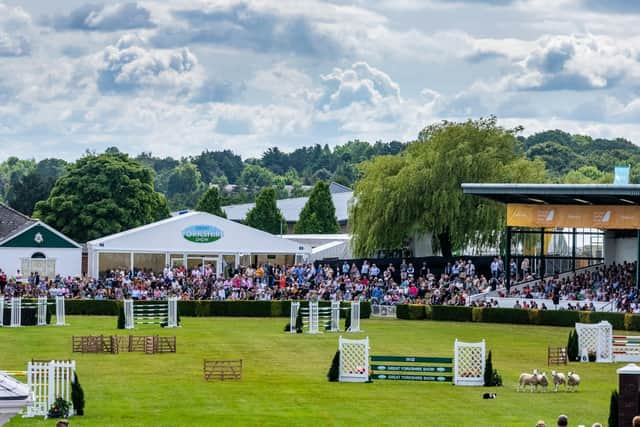Liz Truss's snub of the NFU hustings shows welfare of agriculture isn't a priority for her - Andrew Vine
Theirs is an industry too often taken for granted by a public that hardly pauses to make the connection between year-round hard graft on the land and the groceries that fill its supermarket trollies, and the show is a powerful reminder of the debt of gratitude we owe.
Yet the front-runner to be our next Prime Minister shows worrying signs that the welfare of agriculture is a long way down her list of priorities.
Advertisement
Hide AdAdvertisement
Hide AdLiz Truss’s flat refusal to attend hustings organised by the National Farmers Union last week was an indication of that, as is her rejection of a request by the organisation’s president, Minette Batters, for a meeting, even if only via videolink.


Rishi Sunak attended the hustings, and all credit to him for that. Agriculture is of immense importance in his Richmond constituency and the former Chancellor’s willingness to be questioned by farmers was an acknowledgement that their work is at the heart of our national life.
There is a simple explanation for Ms Truss avoiding potentially awkward questioning by farmers – she has already sold them down the river.
Post-Brexit trade deals with Australia and New Zealand that she loudly trumpeted as successes are nothing of the sort. On the contrary, within a few years they could drive some Yorkshire farmers to the wall by opening the door to cheap imports that undercut their businesses.
Advertisement
Hide AdAdvertisement
Hide AdAfter the deals were signed, one New Zealand media outlet described Britain’s farmers as “sacrificial lambs” because they would not be able to compete on price with meat shipped from the other side of the world.
It is produced more intensively and to lower welfare standards than in Britain. To shoppers under pressure from the cost of living crisis and counting every penny, that cheaper meat is going to be very hard to resist, however much they would like to buy British.
Ms Truss’s trade deals with our cousins Down Under are distinctly one-sided.
The NFU’s director of trade and business strategy Nick von Westenholz, recently told a House of Lords committee that whilst imports would increase, there was little chance of British produce going the other way.
Advertisement
Hide AdAdvertisement
Hide AdHardly surprising that Ms Truss doesn’t fancy an encounter with a roomful of farmers. Her deal phases out all quotas on imports from Australia over the next 15 years.
In other words, our farmers face a relentlessly growing threat to their livelihoods at a time when steeply increasing feed prices and spiralling energy bills are already placing them under enormous pressure.
It takes a special sort of talent to go into negotiations with profound consequences for a vital British industry and come away with a deal that gives everything away but gets nothing in return. And it takes a peculiar mindset to then regard that as a success.
These ruinous deals for agriculture led best-selling farming author James Rebanks to launch a scathing attack on Ms Truss on the day she snubbed the NFU hustings. Rebanks – himself a farmer – condemned her as “possibly the worst person imaginable to be prime minister if you care about farming/food/environment. She’s already proven that as a minister.”
Advertisement
Hide AdAdvertisement
Hide AdThe author of The Shepherd’s Life and English Pastoral stuck the boot in even harder: “You could trawl the gutters of Britain and you’d struggle to find anyone less suitable to lead Britain.”
It may well be that substantial numbers of Yorkshire farmers agree with him. If Ms Truss is to be the next Prime Minister, she’s going to have to make a lot of ground up with the agricultural community, not just because of the threat from imports, but because of the Government’s poor record.
Days before the hustings, the NFU revealed that £60m of food is being left to rot in fields because of labour shortages caused by the exodus of foreign workers after Brexit.
This comes at a time when British food production is increasingly important against the backdrop of global grain supply problems caused by war in Ukraine, which is already a key reason for prices in the shops soaring.
Advertisement
Hide AdAdvertisement
Hide AdAdd to that the sluggish rollout of funding aimed at helping farmers protect the environment, and relations between the Conservatives and an industry which should be a natural ally of the party are at a low ebb.
Ms Truss’s refusal to engage with farmers leaves the impression that she is yet another senior politician who believes that agriculture will somehow look after itself and prosper whatever the circumstances, a misconception shared by successive governments that has long infuriated farmers.